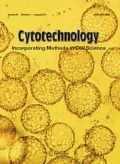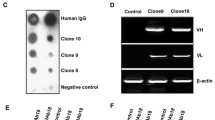Abstract
The effect of natural IgG antibody recognizing β-galactosyl epitope on hepatoma cell invasion was investigated. Anti-β-galactosyl antibody dose-dependently suppressed hepatoma invasion underneath primarily cultured mesothelial cells monolayer without affecting the proliferation, to the same extent as natural IgG antibody with anti-α-galactosyl specificity, which had already been reported to have an anti-metastatic activity. The inhibitory effect of anti-β-galactosyl antibody was completely canceled by adding lactose (galactose-β-1, 4-glucose) to the medium, indicating that this antibody recognized some antigens with β-galactosyl epitope. Hepatoma cells pretreated with this antibody for 48 h showed reduced invasive activity, while the pretreatment of mesothelial cells with the antibody did not affect hepatoma cells invasion. Anti-β-galactosyl antibody also suppressed hepatoma cells adhesion to mesothelial cells monolayer. These results suggest that natural antibody with anti-β-galactosyl specificity may recognize the β-galactosyl epitope in some adhesion-related molecules on hepatoma cells, thus suppressing adhesion and invasion to mesothelial cells monolayer. These results suggest possible therapeutic uses of this antibody in the treatment of metastatic tumors.


Similar content being viewed by others
References
Castronovo V, Foidart JM, Li Vecchi M, Foidart JB, Bracke M, Mareel M, Mahieu P (1987) Human anti-α-galactosyl IgG reduces the lung colonization by murine MO4 cells. Invasion Metastasis 7:325–345
Catronovo V, Colin C, Parent B, Foidart JM, Lambotte R, Mahieu P (1989) Possible role of human natural anti-Gal antibodies in the natural antitumor defense system. J Natl Cancer Inst 81:212–216
Coutinho A, Kazatchkine MD, Avrameas S (1995) Natural autoantibodies. Curr Opin Immunol 7:812–818
Cramer DV (2000) Natural antibodies and the host immune responses to xenografts. Xenotransplantation 7:83–92
Fujita H, Jung SK, Mukainaka Y, Tachikawa H, Fujimoto D, Kosuge T, Shirai T, Takeiri A, Suzuki Y (1994) Characterization of natural IgG antibody with anti-β-galactosyl specificity. Boimed Res 15:17–25
Gollogly L, Castronovo V (1996) A possible role for the α 1–3 galactosyl epitope and the natural anti-gal antibody in oncogenesis. Neoplasma 43:285–289
Jung SK, Sakano Y, Fujimoto D (1992) Natural human IgG antibody with anti-β-galactosyl specificity. Biomed Res 13:317–320
Kozuki Y, Miura Y, Yagasaki K (2000) Inhibitory effects of carotenoids on the invasion of rat ascites hepatoma cells in culture. Cancer Lett 151:111–115
Kozuki Y, Miura Y, Yagasaki K (2001) Resveratrol suppresses hepatoma cell invasion independently of its anti-proliferative action. Cancer Lett 167:151–156
Larkin JM, Norsworthy PJ, A’Hern RP, Eisen TG, Gore ME, Porter CD (2006) Anti-αGal-dependent complement-mediated cytotoxicity in metastatic melanoma. Melanoma Res 16:157–163
Liotta LA, Wewer U, Rao NC, Schiffmann E, Stracke M, Guirguis R, Thorgeirsson U, Muschel R, Sobel M (1988) Biochemical mechanism of tumor invasion and metastasis. Prog Clin Biol Res 256:3–16
Lucq J, Tixier D, Guinault AM, Greffard A, Loisance D, Pilatte Y (2000) The target antigens of naturally occurring human anti-β-galactose IgG are cryptic on porcine aortic endothelial cells. Xenotransplantation 7:3–13
Miura Y, Shiomi H, Sakai F, Yagasaki K (1997a) Assay systems for screening food components that have anti-proliferative and anti-invasive activity to rat ascites hepatoma cells: in vitro and ex vivo effects of green tea extract. Cytotechnology 23:127–132
Miura Y, Furuse T, Yagasaki K (1997b) Inhibitory effect of serum from rats administered with coffee on the proliferation and invasion of rat ascites hepatoma cells. Cytotechnology 25:221–225
Parker W, Lin SS, Yu PB, Sood A, Nakamura YC, Song A, Everett ML, Platt JL (1999) Naturally occurring anti-α-galactosyl antibodies: relationship to xenoreactive anti-α-galactosyl antibodies. Glycobiology 9:865–873
Sandrin MS, McKenzie IF (1994) Gal α (1, 3)Gal, the major zenoantigen(s) recognized in pigs by human natural antibodies. Immunol Rev 141:169–190
Tremont-Lukats IW, Avila JL, Hernández D, Vásquez J, Teixeira GM, Rojas M (1997) Antibody levels against α-galactosyl epitopes in sera of patients with squamous intraepithelial lesions and early invasive cervical carcinoma. Gynecol Oncol 64:207–212
Author information
Authors and Affiliations
Corresponding author
Rights and permissions
About this article
Cite this article
Miura, Y., Fujita, H., Sakai, F. et al. Natural IgG antibody with anti-β-galactosyl specificity suppressed hepatoma cell invasion in culture. Cytotechnology 65, 909–913 (2013). https://doi.org/10.1007/s10616-012-9523-5
Received:
Accepted:
Published:
Issue Date:
DOI: https://doi.org/10.1007/s10616-012-9523-5




